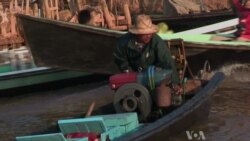INLE LAKE, BURMA —
As Asia’s newest tourist hotspot, Burma is experiencing a surge in foreigners eager to visit places that were closed-off for decades. But the spike in tourists and growth of new industries are taking an environmental toll. Rapid development is straining an already damaged ecosystem in Burma’s scenic Inle Lake.
Inle Lake is considered a jewel of Burma, where migrating birds, rare animal species and a handful of Burmese tribes share space around the 110 square kilometer freshwater reservoir.
Now, a steady stream of foreign tourists is arriving. And, although that means big business for some, many locals say they are losing out.
Floating tomato gardens are the primary cash crop in this area, comprising more than 60 percent of the local agriculture.
Farmer Mee Intara says he welcomes foreign visitors, but not the increased traffic.
“The constant waves from the increase in motorboats are destroying my crops on the lake," said Intara.
Adding to the problem; diesel fuel from the boats, mixed with excessive amounts of pesticides already used by the farmers, are threatening drinking supplies.
Khin Moe Khao says his family and others living on the lake’s islands say they now must fetch clean water from elsewhere.
“The people who have motor boats can go to get drinking water easily, but some of the villagers only have row boats and cannot get to the water supply so they get sick from drinking dirty water," said Khao.
As unregulated development and business moves forward, local environmentalists are also worried about an even bigger potential environmental disaster - runoff from a coal mine.
Khun Chankhe, an environmentalist with the Pa-Oh Youth Organization, says that waste from an open pit coal mine, 13 kilometers away, is ending up in Inle Lake’s watershed, making matters worse.
“Most of the people in the villages rely on the upper Tigyit Creek use the water for their bathing and drinking and travel, so it is very dangerous for them because of the water pollution from the mining. This also affects Inle Lake," said Chankhe.
As tourism and development continue unabated, Burma’s second-largest freshwater lake - and the people that live on it - stand to lose much more.
Inle Lake is considered a jewel of Burma, where migrating birds, rare animal species and a handful of Burmese tribes share space around the 110 square kilometer freshwater reservoir.
Now, a steady stream of foreign tourists is arriving. And, although that means big business for some, many locals say they are losing out.
Floating tomato gardens are the primary cash crop in this area, comprising more than 60 percent of the local agriculture.
Farmer Mee Intara says he welcomes foreign visitors, but not the increased traffic.
“The constant waves from the increase in motorboats are destroying my crops on the lake," said Intara.
Adding to the problem; diesel fuel from the boats, mixed with excessive amounts of pesticides already used by the farmers, are threatening drinking supplies.
Khin Moe Khao says his family and others living on the lake’s islands say they now must fetch clean water from elsewhere.
“The people who have motor boats can go to get drinking water easily, but some of the villagers only have row boats and cannot get to the water supply so they get sick from drinking dirty water," said Khao.
As unregulated development and business moves forward, local environmentalists are also worried about an even bigger potential environmental disaster - runoff from a coal mine.
Khun Chankhe, an environmentalist with the Pa-Oh Youth Organization, says that waste from an open pit coal mine, 13 kilometers away, is ending up in Inle Lake’s watershed, making matters worse.
“Most of the people in the villages rely on the upper Tigyit Creek use the water for their bathing and drinking and travel, so it is very dangerous for them because of the water pollution from the mining. This also affects Inle Lake," said Chankhe.
As tourism and development continue unabated, Burma’s second-largest freshwater lake - and the people that live on it - stand to lose much more.





